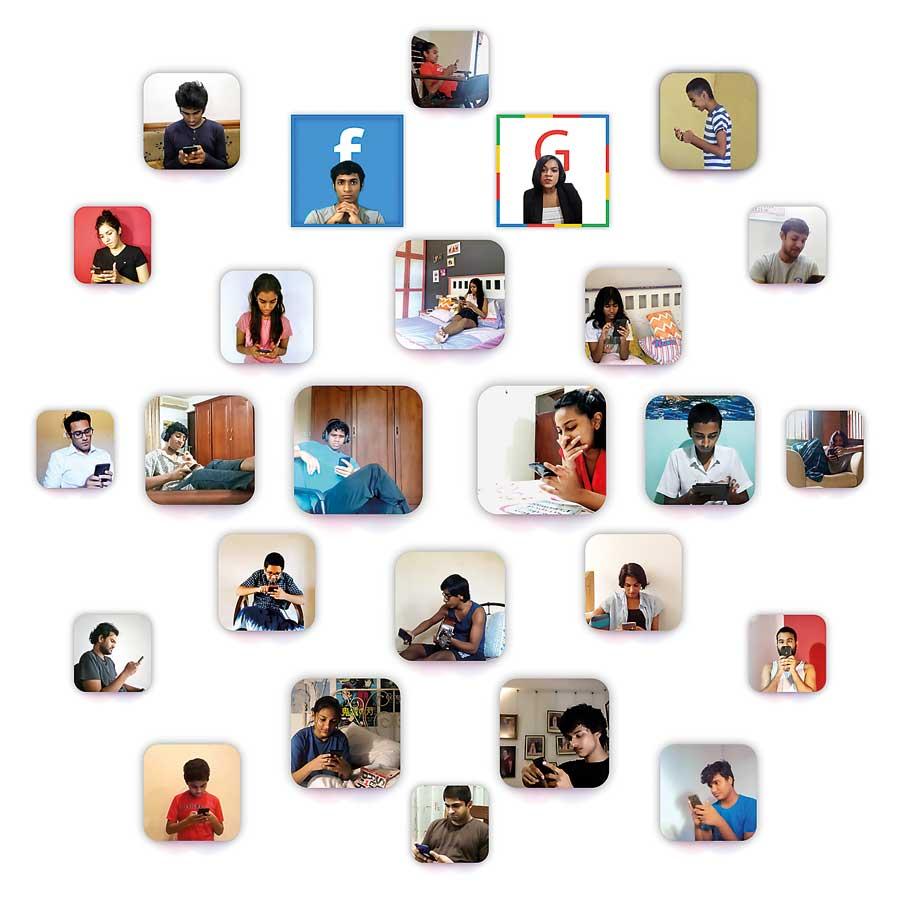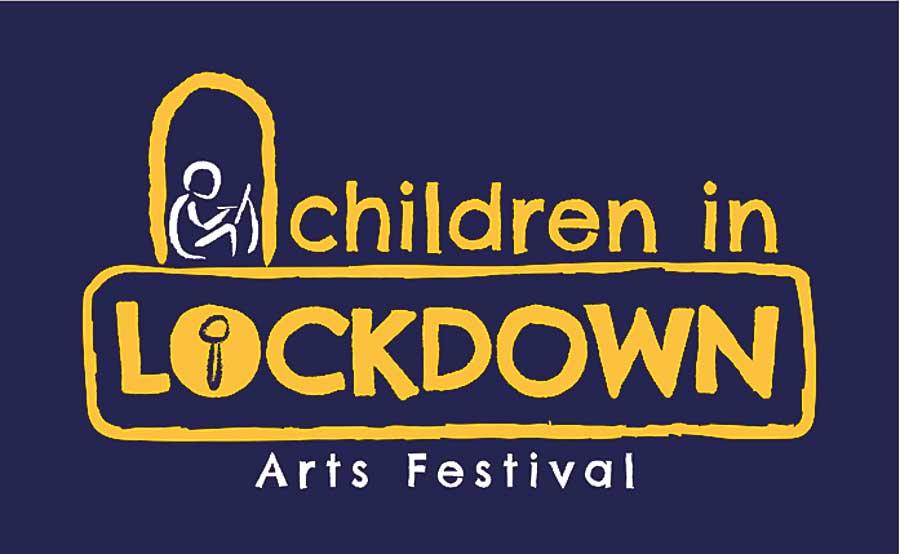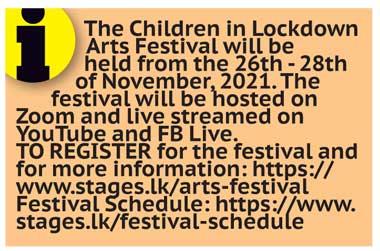Reply To:
Name - Reply Comment
Last Updated : 2024-04-26 16:45:00
A unique reflection on how children experienced the pandemic

- Organizers invite families to share this creative exploration of the pandemic, to learn and experience, together
- The free virtual arts festival will have public screenings of unique artworks produced and performed by children together with adults as well as live interactive sessions
- The festival is an opportunity to address the experiences of the most vulnerable groups in society: children

“They are good sports, you know… kids. They take so many knocks, put up with so much. I think in the pandemic adults have lost track of just how much we have burdened children with,” said Ruwanthie De Chickera, Artistic Director and founder member of Stages Theatre Group, as she enters the final weeks of preparation, before a much anticipated theatre festival focused on children.
pandemic adults have lost track of just how much we have burdened children with,” said Ruwanthie De Chickera, Artistic Director and founder member of Stages Theatre Group, as she enters the final weeks of preparation, before a much anticipated theatre festival focused on children.
Stages Theatre Group (STG) is an ensemble theatre company producing socially and politically conscious original theatre. Together with filmmaker Malith Hegoda and artist Piumi Wijesundara, Ruwanthie and her team are all geared up to present us with a rare opportunity to reflect on just how much the pandemic has changed our lives.
The Children in Lockdown Arts Festival 2021 is a virtual theatre festival, which gathers together artists, children, and adults to reflect on the treatment and experiences of children in Sri Lanka during the COVID-19 pandemic. The festival comprises of 3 days of public screenings and live interactive digital sessions and a closing plenary for select artists.
The festival is the culmination of a 6-month programme curated by Stages Theatre Group (STG) and supported by Kindernothilfe (KNH), through which 20 artworks addressing the challenges faced by children during the pandemic were commissioned.
“For 6 months we had children and adult artists working on creative outputs, be it short films, plays, artist research, artist interventions, awareness programmes and writing. There was a creative process which preceded the festival,” said Ruwanthie, who together with Malith Hegoda co-curated the process, while Piumi is the
Festival Director.
"Parents were crying by the end of the performance. They never thought that their children thought about these things. It never occurred to them that their own children were worried about them – Ruwanthie De Chickera"
What is the festival about, we asked Ruwanthie and Piumi. “The festival is basically an opportunity for us as a society to address something that hasn’t been addressed over the last two years during the entire pandemic, which is the experiences of the most vulnerable groups of society and that’s children ,” she said.
Ruwanthie recalled of how little attention was directed towards children and what they endured during the extensive lockdowns of 2020 and 2021. “There was a little bit of attention on school, but not enough. Then there were crisis calls to help centres, so we understood that domestic violence was increasing. But that was also a peripheral issue. We feel that as a country and as a society that we haven’t really reflected the impact of this pandemic on children. We wanted to do that as an artists group,” she explained.
“We wanted a creative criticism and insight to the pandemic and how it was experienced by society.
The festival is a chance to pause for a little bit as both children and adults. To focus on the various experiences of children in this pandemic,” Ruwanthie added.
Children’s voices barely heard
Festival Director Piumi Wijesundara who has dedicated several years to creating original theatre productions with children believes that children should be empowered to share their own stories.
“When adults take a step back and really allow kids to talk about the issues they feel are important, children actually come up with incredible productions. They come up with things that we didn’t perhaps think about,” Piumi said, adding that the same could be observed about the Children in Lockdown Festival. “What we’ve seen is that children’s voices have barely been heard, specially during the pandemic.”
“Schools have been in a hurry to finish the syllabuses, work on their exams. Even with the children we’ve been working with, we’ve been hearing about how exhausted they have been. Or how they have been dealing with exam after exam. So specially in a setting like this where children are dealing with a lot, not listening to children and the real issues that they go through, I think that’s a problem,” Piumi observed.
"When adults take a step back and really allow kids to talk about the issues they feel are important, children actually come up with incredible productions – Piumi Wijesundara"
Voices of children should be heard, this is what both thespians strongly believe in. They share that the open call for the festival saw about 80 applications. Out of this, some 20 applications were from children. “Nine out of these current commissioned artworks are initiated by children themselves. There are seven individual children working on their projects and we also have 2 artworks that are produced by child artist groups, where they are talking about issues that they think are important,” Piumi shared.
However, curating an online arts festival, even after almost two years into this new way of life, is no easy task. Asked about the challenges of doing a digital theatre festival Ruwanthie said that it is a completely novel area for the STG team as well. “When we started off, we had a physical festival in mind in 2020. But with the second wave and the more recent events, we had no clear idea as to how things were going to pan out. So we spoke to the artists and took a really tough decision to go digital.”
“It is a completely new area for us. It is not an area we are familiar with. But we’ve had people to advise and help us, so we are learning,” Ruwanthie added. She is also excited about the prospects that a digital festival introduces. She believes that by going digital, the scope and reach of the festival have widened. “The experience will be different to what a theatre company is used to, but they are learning on the run, like everybody else,” Ruwanthie said.
Addiction, misinformation and privacy
Maleen Jayasuriya represents the Digital Wellbeing Initiative whose commissioned project called #Reconnectus brings children across Sri Lanka to address four social media challenges—addiction, misinformation, privacy issues, and cyber bullying, through the creation of Public Service Announcements. “We have about 20 child artists working on our project. The project is on issues around technology and how it affects wellbeing of children and adults,” Maleen said.
For the last couple of years, Maleen and a group of young professionals have been observing an alarming trend of technology surpassing all the usual regulatory systems of society. “Be it policymakers, schools, the family, they can’t keep up with the pace at which technology is developing. We see a breakdown in the regulatory systems that are meant to protect society,” he said.
"It’s been real fun to direct these kids with this project. They’ve done it all digitally, at home with their smartphones and now we’re editing it all together. I think it’s coming along really well – Maleen Jayasuriya"
Maleen is an engineer by profession and the group of young professionals of the Digital Wellbeing Initiative include a doctor, a lawyer, a social media marketing expert, as well as Piumi, the festival director. “We have a diverse set of individuals and when the open call came, we were excited to start on a project with kids,” Maleen recalled.
The project itself was to create a bunch of public service announcement videos. But rather than adults lecturing kids on what was bad or good, the team wanted kids to come up with the videos themselves, he explained. “We wanted the kids to write the scripts, do the productions, so that they themselves can talk to their generation about these issues.”
One of the problems Maleen observes is that we are increasingly being digitalized but failing to talk about the problems which surround digitalization.
The issues that were specifically targeted were on social media addiction, cyber bullying including the constant comparison and negative evaluation of themselves, misinformation and privacy. “Without gatekeepers who filter information, people now have direct access to both information and misinformation,” Maleen said.
Unless the next generation is taught how to deal with this, the situation will only grow worse, he added. “I think we are already seeing the results of this, with things like the anti-vaccination movement. And it gets scarier, because smartphones are getting cheaper. Everyone has access to the internet but not everyone has the skills to sift through misinformation, he opined.
“It’s been real fun to direct these kids with this project. They’ve done it all digitally, at home with their smartphones and now we’re editing it all together. I think it’s coming along really well and we’re excited to share it with everyone,” Maleen added.
Mental health challenges faced by the young
“I didn’t know what I was going to do when I applied,” said young artist Shavindri Peiris. “I didn’t think I was particularly good at acting or anything but I really liked writing. I wanted to create something around an important issue. Something that I noticed is that when we talk about wellbeing we always ask how someone is in terms of physical wellbeing.”
"The research was quite tough. I was dealing with self-harm or suicide and those are not exactly pleasant topics to read about – Shavindri Peiris"
Shavindri noticed that in media, books and even among her friends, topics such as depression, anxiety was becoming quite common. “Some of my friends told me that I’m going to therapy and I have depression. I felt really bad, because I just thought that they were feeling down,” she recalled.
“So I began researching on this, realizing that it is something that is not being addressed. Her research, she decided to express with poetry. At one point Shavindri dealt with anxiety herself, unable to write. “The research was quite tough. I was dealing with self-harm or suicide and those are not exactly pleasant topics to read about,” she added. But with sheer determination and plenty of support from her parents and mentors, she soon began writing again. Her project titled ‘Healing Tears’ focuses on mental health challenges endured by young people and their families during the pandemic.
Fathers can be emotional too
Thaththage ware (Father’s Turn) is another interesting project brought to life through this festival. A workshop conducted by Velusami Weerasingham and Sulochana Dissanayaka, the event talks of tougher aspects of masculinity.
Gender stereotypes negatively impact children, Weerasingham said, especially during the pandemic. “As Shavi said, there are so many problems that kids experience even at home. Even a mother doesn’t have the privacy she would have had earlier. Everyone’s locked together in lockdown. So how can we help fathers to get involved in care work at home?,” Weerasingham shared that this will be the question in discussion at his workshop.
“Because of our culture, most fathers lack the emotional capacity. We tried to promote the idea of an emotional father. Fathers are strong providers, tough decision makers, or controllers. During the times of Covid-19, this type of attitude and behaviour can impact children even more negatively.
We tried to work with fathers as well as teachers. Knowingly or unknowingly, teachers too promote gender stereotypes with children. So myself and Sulochana, devised a programme to show how emotional fatherhood is important,” he shared.
Weerasingham believes that both children and fathers suffer due to their inability to form a good, emotional relationship. He doesn’t fail to note that he would have preferred to do the programme physically, where the impact of this programme would be more. “But something is better than nothing,” he admitted.
A moving experience
These 20 different forms of artwork created by both child and adult artists include theatre art installations, puppet shows, short-film screenings, and artist talks. All of these will be publicly released for the first time during the online sessions of the Children in Lockdown Arts Festival 2021 on the 26th, 27th, and 28th of November.
The festival will also be a space for communities to meet, discuss, debate, and communicate on the issues faced by children during the pandemic. This will be done through talks, panel discussions, workshops, and forums led by children, adults, artists, and professionals working with children.
Asked about what they can learn through this festival, the artists have various answers. Maleen believes that some people who are uptight about the issues that would be discussed at this festival, would be disarmed by the ingenuity and creativity of these kids.
"There are so many problems that kids experience even at home. Even a mother doesn’t have the privacy she would have had earlier - Velusami Weerasingham"
“One of the commissioned projects were for two artists who were working in one of the estates in Bogawanthalawa,” said Ruwanthi. The idea was to explore how children of the estates faced the pandemic. “The parents of these kids had no idea what they were doing when they attended these drama workshops. In fact a couple of them had been beaten up when they went home, because the parents thought the kids were wasting the whole day. The artists had to intervene and convince the parents to send the children back.”
“With the levels of poverty and other issues, these parents had very little understanding or appreciation of what these children were doing. But nonetheless, these small group of children, with tremendous hardships, have created this beautiful piece, which was based on their own experiences of Covid-19.
these children were doing. But nonetheless, these small group of children, with tremendous hardships, have created this beautiful piece, which was based on their own experiences of Covid-19.
“One of the first performances they did was for their parents. And that was a very touching thing. Their parents were crying by the end of the performance. They never thought that their children thought about these things. It never occurred to them that their own children were worried about them. It was a very moving experience,” Ruwanthie recalled.

Add comment
Comments will be edited (grammar, spelling and slang) and authorized at the discretion of Daily Mirror online. The website also has the right not to publish selected comments.
Reply To:
Name - Reply Comment
US authorities are currently reviewing the manifest of every cargo aboard MV
On March 26, a couple arriving from Thailand was arrested with 88 live animal
According to villagers from Naula-Moragolla out of 105 families 80 can afford
Is the situation in Sri Lanka so grim that locals harbour hope that they coul